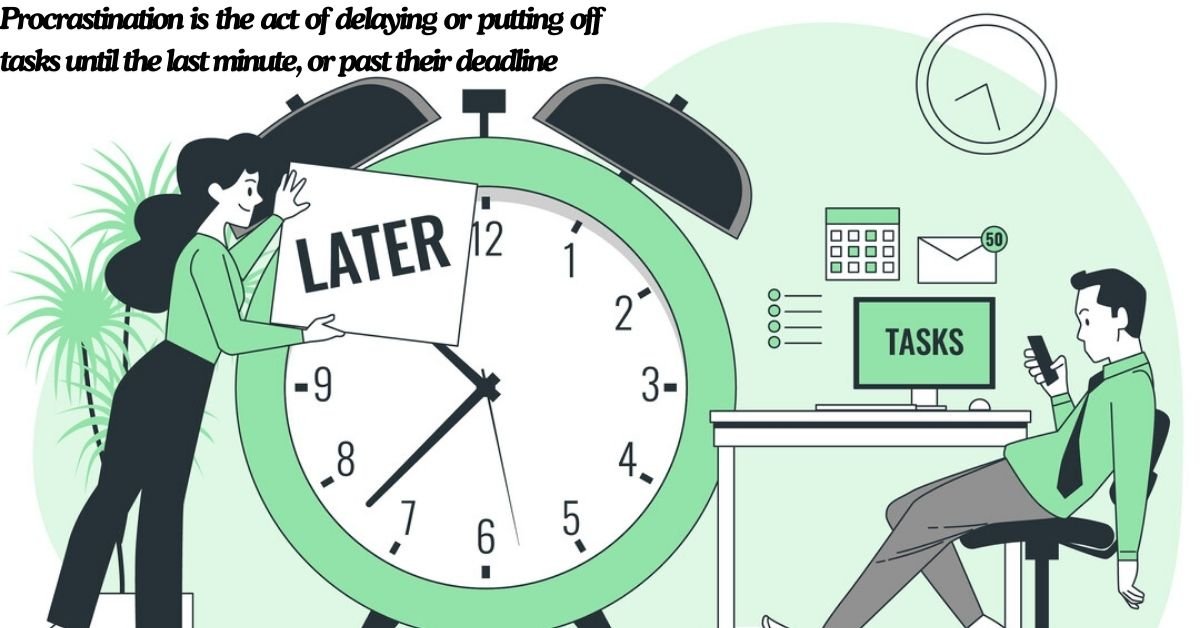Ever stared down a deadline, the pressure building like a kettle about to burst, only to realize you’ve left yourself scrambling at the last minute? Welcome to the club! Procrastination, the act of delaying or postponing tasks despite potential negative consequences, is a universal human experience.
This introduction grabs attention by acknowledging the commonality of procrastination. It then provides a clear definition without being overly academic.
Procrastination
Ah, procrastination. The arch-nemesis of productivity, the champion of “I’ll do it tomorrow,” and a foe we’ve all battled at some point. But what exactly is procrastination, and why does it have such a hold on us? Buckle up, fellow warriors, because we’re about to dissect this beast and learn how to vanquish it.
What is Procrastination?
Procrastination is the act of voluntarily delaying or postponing a task despite knowing there could be negative consequences. It’s not just laziness – it’s a complex interplay of emotions, beliefs, and avoidance behaviors. We might put things off because a task feels overwhelming, or boring, or we fear failure.
The Procrastination Spectrum: Unveiling Your Inner Procrastinator
We all know the feeling. That looming deadline, the unfinished task list, the sinking sensation of “I should have started sooner.” Procrastination, the thief of time, comes in many forms. But have you ever stopped to consider what kind of procrastinator you are? Understanding your procrastination style is the first step to conquering it.
The Six Faces of Procrastination
-
The Perfectionist: This procrastinator is crippled by the fear of imperfection. They get bogged down in details, endlessly revising and rewriting, never feeling quite satisfied enough to finish.
-
The Dreamer: Big on ideas but short on follow-through, the Dreamer gets lost in the “what-ifs” and grand plans. They struggle to translate their exciting visions into concrete action.
-
The Worrier: Anxiety reigns supreme for this procrastinator. They fret about potential roadblocks and dwell on worst-case scenarios, leading to paralysis by overthinking.
-
The Defier: Rebellion fuels this procrastinator. They resist deadlines and authority figures, putting things off as a way to assert independence, even if it harms them in the long run.
-
The Crisis Maker: Thriving on adrenaline, the Crisis Maker waits until the absolute last minute. They find a twisted satisfaction in the pressure and scramble of eleventh-hour heroics.
-
The Overdoer: With a never-ending to-do list, the Overdoer takes on too much. They become overwhelmed by their commitments, leading to procrastination as they struggle to prioritize and delegate.
Unmasking Your Procrastination Style
Think about your past procrastination battles. Do you recognize yourself in any of these descriptions? Maybe you identify with a blend of a few. The key is to identify your triggers.
- Perfectionist
Do you get stuck in endless loops of editing and revising?
- Dreamer
Do you struggle to translate your ideas into actionable steps?
- Worrier
Do you get bogged down by “what-ifs” and worst-case scenarios?
- Defier
Do you find yourself putting things off out of a sense of rebellion?
- Crisis Maker
Do you thrive on the pressure of deadlines and last-minute heroics?
- Overdoer
Do you feel overwhelmed by your commitments and struggle to prioritize?
Knowing Yourself is Half the Battle:
By understanding your procrastination style, you can develop targeted strategies.
-
The Perfectionist:
You might be a perfectionist if you get bogged down in details, rewriting endlessly and never feeling satisfied enough to call something “done.” Solution: Set achievable deadlines for drafts, not the final product. Celebrate completing these drafts as mini-victories. This helps you make progress without getting paralyzed by the need for flawlessness.
-
The Dreamer:
Big ideas are your forte, but translating them into action can be daunting. Solution: Break down your grand vision into smaller, manageable steps. Start with the most essential first action and build momentum from there. This makes the seemingly overwhelming task less intimidating and more achievable.
-
The Worrier:
Anxiety about failure might be holding you back. Solution: Challenge those negative thoughts. What’s the worst that can happen? Most likely, it won’t be as bad as you imagine. Develop healthy coping mechanisms for anxiety, like meditation or deep breathing exercises. Taking action, even in small ways, can often alleviate worry.
- The Defier:
You might be a defier if you rebel against deadlines and structure, putting things off out of spite. Solution: Set clear goals and deadlines for yourself, even if they feel a little uncomfortable. Hold yourself accountable for meeting them. This way, you’re taking control of your own schedule, rather than letting external pressure dictate your actions.
- The Crisis Maker:
You might thrive on last-minute heroics, waiting until the pressure is on before taking action. Solution: Learn to say no to additional commitments when your plate is already full. Reward yourself for starting tasks early, not just for completing them in a frenzy at the eleventh hour. This will help you build a habit of proactive action instead of waiting for the adrenaline rush of a looming deadline.
- The Overdoer
You might be an overdoer if you take on too much and struggle to delegate or ask for help. Solution: Prioritize your tasks ruthlessly. Learn to delegate what you can and don’t be afraid to ask for assistance when needed. Remember, it’s okay to say no to extra commitments if you know you’re already stretched thin. Taking care of yourself and managing your workload effectively will ultimately allow you to accomplish more in the long run.
Why Do We Procrastinate?
These are several reasons why we procrastinate:
- Fear of Failure
Sometimes, the fear of not doing something perfectly can be paralyzing. We might put off a project because we’re afraid it won’t be good enough.
- Task Aversion
Let’s be honest, some tasks are just plain dreadful. We might procrastinate on cleaning the house or doing our taxes because they’re simply not enjoyable.
- Perfectionism
Perfectionists often set unrealistic expectations for themselves, leading to procrastination as they become overwhelmed by the idea of not achieving perfection.
- Decision Paralysis
When faced with a complex task, we might freeze up, unsure of where to start. This indecisiveness can lead to procrastination.
- Impulsivity
Ironically, sometimes we procrastinate on important tasks because we get sidetracked by more immediate, albeit less important, distractions.
Can We Delete Procrastination?
Unfortunately, we can’t completely erase procrastination from our minds. It’s a normal human behavior. However, we can certainly learn to manage it more effectively.
Slaying the Procrastination Monster: Your Battle Plan
-
Identify Your Triggers
The first step is to understand what makes you procrastinate. Are you a perfectionist who gets bogged down in details? Do you find yourself easily distracted? Once you know your triggers, you can develop strategies to address them.
- Break Down Big Tasks
Large, looming tasks can feel overwhelming, leading to procrastination. Try breaking them down into smaller, more manageable steps. This will make the task seem less daunting and help you get started.
- Just Get Started (Even for a Few Minutes)
Often, the hardest part is simply beginning. Set a timer for 10 minutes and commit to working on the task for that short period. You might be surprised at how much you can accomplish in a short burst.
- Reward Yourself
Positive reinforcement is powerful. Set small rewards for completing tasks or reaching milestones. This will help you stay motivated and on track.
-
Minimize Distractions
Turn off notifications, silence your phone, and find a quiet workspace to minimize distractions.
-
Forgive Yourself and Move On
We all procrastinate sometimes. Don’t beat yourself up if you fall back into old patterns. Acknowledge it, learn from it, and recommit to your goals.
The Disadvantages of Procrastination
Procrastination can have a significant impact on our lives. It can lead to:
- Stress and Anxiety
The looming deadline and the knowledge of unfinished tasks can cause significant stress and anxiety.
- Decreased Productivity
When we procrastinate, we get less done, which can negatively impact our work or studies.
- Reduced Quality of Work
When we rush to complete tasks at the last minute, the quality of our work often suffers.
- Missed Opportunities
Procrastination can lead to us missing deadlines or opportunities.
Remember, you are not alone in this battle. Procrastination is a common human experience. By understanding why we procrastinate and developing strategies to manage it, we can reclaim our time and achieve our goals.
Conclusion
Procrastination is a common foe, but it doesn’t have to control us. By understanding its triggers and implementing effective strategies, we can overcome the urge to delay and achieve our goals. Remember, progress is better than perfection. Start small, celebrate milestones, and reward yourself for taking action. With consistent effort, we can transform procrastination into a motivator for getting things done, one step at a time.
Procrastination might offer temporary relief, but it steals opportunities for growth. By prioritizing tasks and embracing discomfort, we invest in our future selves. The satisfaction of accomplishment and the momentum gained from taking action propel us further. Remember, the best time to start is always now. Don’t let procrastination dim your potential. Embrace the power of action and watch your future flourish.

There are many productivity apps and techniques available to help you combat procrastination. Find what works best for you and experiment until you discover your arsenal of anti-procrastination weapons.









I’m not sure exactly why but this weblog is loading extremely slow for me. Is anyone else having this problem or is it a problem on my end? I’ll check back later and see if the problem still exists.
Do you have a spam issue on this site; I also am a blogger, and I was wanting to know your situation; we have created some nice practices and we are looking to swap methods with other folks, be sure to shoot me an e-mail if interested.
Some genuinely interesting details you have written.Aided me a lot, just what I was searching for : D.
Greetings! Very helpful advice on this article! It is the little changes that make the biggest changes. Thanks a lot for sharing!